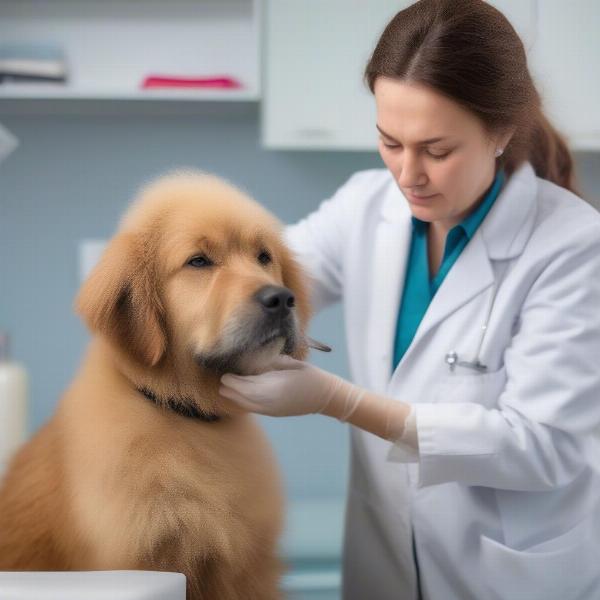Rough dogs, often characterized by their wiry, dense coats, encompass a diverse group of breeds. Understanding what “rough” truly signifies in terms of dog characteristics is crucial for potential owners. This means not only recognizing the unique grooming needs that come with a rough coat but also delving deeper into the temperament, training requirements, and overall care these dogs require. From the tenacious terrier to the loyal sheepdog, let’s explore the world of rough-coated canines.
Decoding “Rough”: What Does a Rough Coat Mean?
What exactly distinguishes a rough coat from other coat types? Rough coats are typically thick, wiry, and often weather-resistant. This texture is a result of a combination of longer, harsher guard hairs and a dense undercoat. While the term “rough” might sound coarse, these coats can be surprisingly soft, depending on the breed. Understanding the specific coat characteristics of your chosen breed is vital for effective grooming.
Temperament and Personality of Rough-Coated Dogs: A Diverse Group
While the rough coat is a shared characteristic, the temperaments of these breeds vary widely. Some, like terriers, are known for their energetic and tenacious personalities, bred originally for hunting vermin. Others, such as sheepdogs, exhibit a more reserved and protective nature, deeply loyal to their families. Researching breed-specific temperaments is paramount before welcoming a rough dog into your home.
Training a Rough Dog: Adapting to Individual Needs
Just as temperaments differ, so do training approaches. Some rough-coated breeds, like the Border Collie, are highly intelligent and excel in obedience training, thriving on mental stimulation. Others, like some terrier breeds, can be more independent and require patience and consistency. Positive reinforcement methods are generally recommended for all breeds.
Grooming Essentials for a Healthy Rough Coat
Maintaining a healthy rough coat requires regular grooming. Brushing is essential to prevent matting and tangles, especially in breeds with a dense undercoat. The frequency and type of brush will depend on the specific breed’s coat. Some rough-coated breeds may require professional hand-stripping to maintain the correct coat texture and color.
Health Considerations for Rough Dogs
While rough dogs are generally hardy, certain breed-specific health concerns can arise. Hip dysplasia, eye problems, and skin allergies are some potential issues to be aware of. Regular veterinary checkups and a healthy diet are crucial for maintaining their overall well-being.
 Veterinary Checkup for a Rough-Coated Dog
Veterinary Checkup for a Rough-Coated Dog
Conclusion: Embracing the Rough and Tumble World of Rough Dogs
Rough dogs, with their distinctive coats and diverse personalities, offer a rewarding companionship experience. Understanding their specific needs, from grooming to training, ensures a harmonious relationship. By acknowledging the nuances of each breed, you can provide the best possible care for your rough and tumble companion.
FAQ:
- Do all rough dogs need professional grooming? Not all rough dogs require professional grooming, but some breeds benefit from hand-stripping to maintain coat health.
- Are rough dogs good with children? Some rough-coated breeds are excellent with children, while others may be more suited to homes with older children or no children at all. Breed research is key.
- How often should I brush my rough dog? The brushing frequency depends on the breed and coat type, ranging from a few times a week to daily.
- What are some common health issues in rough dogs? While generally healthy, some rough-coated breeds are prone to hip dysplasia, eye problems, and skin allergies.
- Are rough dogs good for first-time owners? Some rough-coated breeds are suitable for first-time owners, while others may be better suited to experienced dog owners.
- Do rough dogs shed a lot? Shedding varies between breeds, but even rough-coated dogs shed to some degree.
- What kind of diet is best for a rough dog? A high-quality, balanced diet appropriate for the dog’s age and breed is essential.
famous dog painting
wellingborough dog rescue
dog weave poles
scarborough dog friendly cottages
About ILM Dog: ILM Dog is your comprehensive resource for all things dog-related, offering expert advice on breeds, health, training, nutrition, grooming, and much more. We connect dog lovers worldwide with valuable information to enhance the well-being of their canine companions. From choosing the right breed to providing optimal care, ILM Dog is your trusted partner on your dog ownership journey. Contact us at [email protected] or +44 20-3965-8624 for any inquiries.